Land Acquisition Compensation and Tribal Women’s Succession Rights: Supreme Court Ruling
The Supreme Court recently adjudicated a crucial case involving the inheritance rights of a Scheduled Tribe woman in relation to compensation awarded for land acquisition. The case of Kamla Neti (Dead) through LRs vs. The Special Land Acquisition Officer & Ors. raised critical questions regarding the application of the Hindu Succession Act to tribal communities and whether Scheduled Tribe women are entitled to equal inheritance rights.
The appellant, Kamla Neti, challenged the decision of the High Court of Orissa, which upheld the Reference Court’s ruling that she was not entitled to a share in the compensation for the acquired land. The primary legal issue before the Supreme Court was whether the provisions of the Hindu Succession Act, 1956, apply to Scheduled Tribes, and if not, whether such exclusion was justifiable under the Constitution of India.
Background of the Case
The land in question was originally recorded in the name of late Satyananda Negi, a common ancestor of the appellant and other coparceners. Upon his death, the land was inherited by his two sons, Chakradhar and Gajadhar. The lineage continued through the male heirs, and eventually, the land was acquired by the government for the establishment of an Ultra Mega Power Project in Bhedabahal, Sundargarh district.
Following the acquisition, compensation amounting to Rs. 5,97,35,754/- was awarded to the surviving male heirs and the daughters of Gajadhar. However, Kamla Neti, the daughter of Chakradhar, was denied a share in the compensation. She contended that she was entitled to a 1/5th share, arguing that the principles of the Hindu Succession Act should apply to her case.
Petitioner’s Arguments
The counsel representing the appellant advanced several arguments in support of her claim:
- The denial of succession rights to Scheduled Tribe women violates Article 21 of the Constitution, as it deprives them of their right to livelihood.
- The Hindu Succession Act should apply equally to all Hindu daughters, including those belonging to Scheduled Tribes, ensuring parity in inheritance rights.
- The Supreme Court, in Madhu Kishwar & Ors. vs. State of Bihar & Ors. (1996) 5 SCC 125, recognized the discriminatory impact of excluding tribal women from inheritance rights.
- Exclusive inheritance by male heirs must be reconsidered to align with the constitutional guarantee of gender equality.
Respondents’ Arguments
The respondents opposed the appeal, citing the following legal grounds:
- Under Section 2(2) of the Hindu Succession Act, the provisions of the Act do not apply to Scheduled Tribes unless expressly notified by the government.
- The land originally belonged to Satyananda Negi, and after his death, it was inherited by his sons under customary law, which did not recognize equal rights for daughters.
- Since Chakradhar passed away before the enactment of the Hindu Succession Act, his property devolved according to tribal customs, excluding female heirs.
- Previous Supreme Court judgments, including Labishwar Manjhi vs. Pran Manjhi (2000) 8 SCC 587, upheld the principle that tribal customs take precedence unless explicitly superseded by legislation.
Supreme Court’s Ruling
The Supreme Court upheld the judgment of the High Court and the Reference Court, ruling that Kamla Neti was not entitled to claim a share in the compensation. The Court reasoned:
“As long as Section 2(2) of the Hindu Succession Act remains unamended, the parties shall be governed by its provisions. The appellant, being a member of the Scheduled Tribe, cannot claim rights under the Hindu Succession Act.”
Read also: https://judgmentlibrary.com/supreme-court-upholds-maharashtras-decision-on-village-land-protection/
While the Court dismissed the appeal, it also highlighted the need for legislative reform to address the unequal treatment of tribal women in matters of inheritance. The Court emphasized:
“Denying inheritance rights to female members of Scheduled Tribes, when daughters of non-tribal communities enjoy such rights, is unjust. The Central Government must consider amending the Hindu Succession Act to remove the exclusion of Scheduled Tribes.”
Analysis of the Judgment
This ruling reinforces the longstanding legal position that the Hindu Succession Act does not apply to Scheduled Tribes unless explicitly notified by the government. However, the Supreme Court’s observations signal a strong push for legislative intervention to correct the gender disparity in tribal inheritance laws.
The key takeaways from this judgment include:
- The Hindu Succession Act is not automatically applicable to Scheduled Tribes.
- Customary laws prevail in tribal communities unless overridden by legislation.
- The Supreme Court recognizes the need for gender parity in tribal inheritance laws but asserts that only the legislature can effect such a change.
- The judgment calls upon the Central Government to examine the issue and consider necessary amendments.
Impact on Future Cases
This decision will likely serve as a precedent for future disputes involving inheritance rights of tribal women. Unless the government amends the law, tribal women will continue to be denied equal succession rights.
However, the Supreme Court’s strong remarks urging legislative action indicate that reforms may be on the horizon. If the government acts upon the Court’s suggestion, it could lead to a significant shift in property rights for Scheduled Tribe women.
Conclusion
The case of Kamla Neti underscores the ongoing legal challenges faced by tribal women in claiming equal inheritance rights. While the Supreme Court upheld the existing legal framework, it also acknowledged the inherent unfairness in denying succession rights to tribal daughters. The ball is now in the government’s court to enact reforms that ensure equality in inheritance laws for all women, regardless of their tribal status.
Petitioner Name: Kamla Neti (Dead) through LRs.Respondent Name: The Special Land Acquisition Officer & Ors..Judgment By: Justice M.R. Shah, Justice Krishna Murari.Place Of Incident: Sundargarh, Odisha.Judgment Date: 09-12-2022.
Don’t miss out on the full details! Download the complete judgment in PDF format below and gain valuable insights instantly!
Download Judgment: kamla-neti-(dead)-th-vs-the-special-land-acq-supreme-court-of-india-judgment-dated-09-12-2022.pdf
Directly Download Judgment: Directly download this Judgment
See all petitions in Property Disputes
See all petitions in Damages and Compensation
See all petitions in Judgment by Mukeshkumar Rasikbhai Shah
See all petitions in Judgment by Krishna Murari
See all petitions in dismissed
See all petitions in supreme court of India judgments December 2022
See all petitions in 2022 judgments
See all posts in Civil Cases Category
See all allowed petitions in Civil Cases Category
See all Dismissed petitions in Civil Cases Category
See all partially allowed petitions in Civil Cases Category







